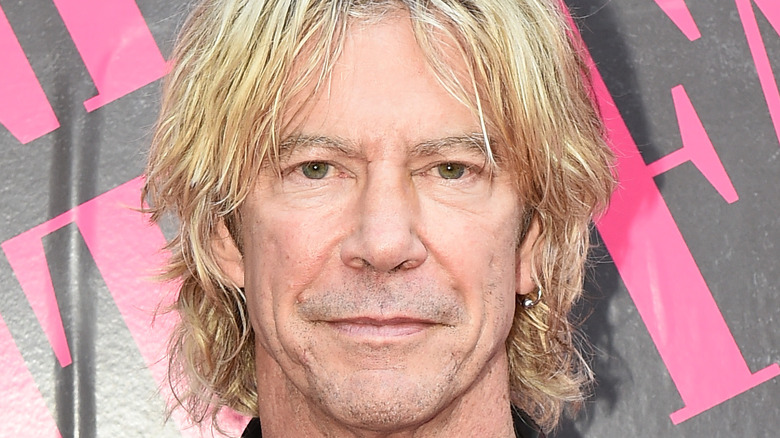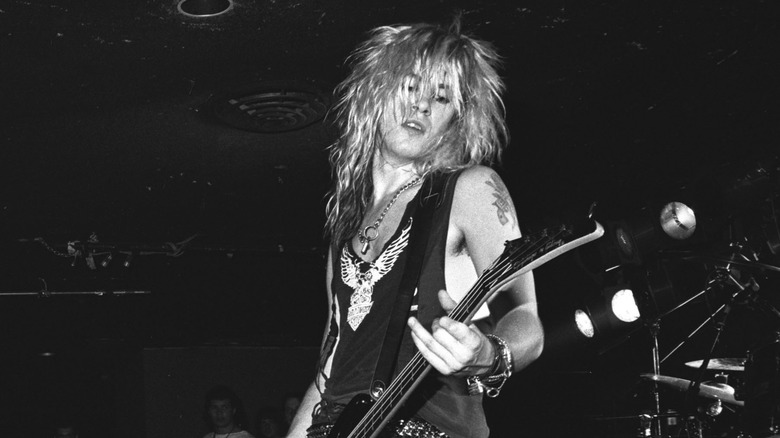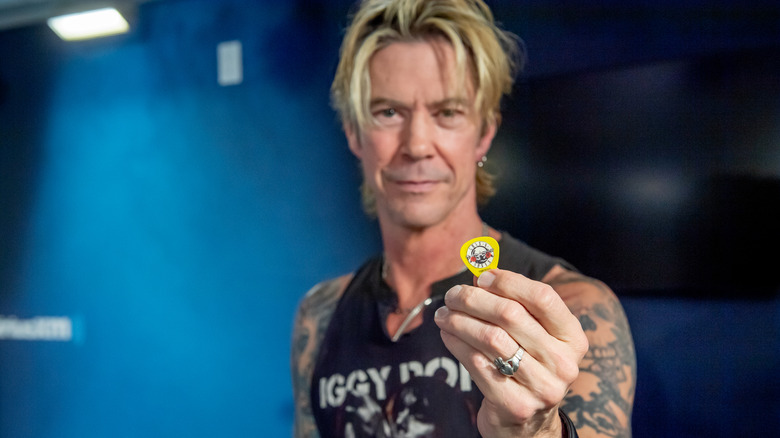The Time Guns N' Roses' Duff McKagan's Pancreas Exploded
We may receive a commission on purchases made from links.
Rock band Guns N' Roses was formed in California in the mid-'80s and their first studio album, "Appetite for Destruction," came out in 1987. But it wasn't until their second single, "Sweet Child O' Mine," was released a year later that they catapulted into stardom (via History). The band cemented its place in the music industry, and as the years passed, they gained a huge following that made them one of the biggest rockstars of the late '80s up to the early '90s. And it was no surprise that the band members lived the stereotypical lifestyle of rockstars as well. Throughout the years, some members of the band, including bassist Duff McKagan, have candidly opened up about their drug and alcohol use.
In an interview with Lily Cornell Silver on the "Mind Wide Open" podcast, per iHeart, McKagan stated that his substance dependence stemmed from panic attacks, the first of which he experienced when he was 16 years old. He used drugs and alcohol to cope with the attacks, and that's how he lived for a little more than a decade of his life. Over the years, he realized that he needed more alcohol to cope until he consumed up to a gallon of vodka a day while also using drugs.
If you or anyone you know needs help with addiction issues, help is available. Visit the Substance Abuse and Mental Health Services Administration website or contact SAMHSA's National Helpline at 1-800-662-HELP (4357).
A lifestyle of excess
Guns N' Roses toured different locations, and by the early 1990s, Duff McKagan said his alcohol intake "had reached epic proportions," per Maxim. He recalled smoking crack cocaine with bandmate Slash in a private jet during a tour, and he couldn't recall some of the gigs he played. In his memoir titled "It's So Easy: And Other Lies," McKagan said that being dependent on alcohol wasn't part of his dream — he just wanted to play music. Sometime in 1992, he attempted to quit drinking, but no matter how much he tried, he fell back into his vices. A year later, he substituted vodka with wine, but that didn't help either, as he gradually increased his intake until he was consuming up to 10 bottles of wine in a day.
In an interview with GQ, McKagen revealed that was one of the lowest points in his life, and he didn't care about the consequences of his actions. "I just didn't care about being alive. I couldn't get myself out of a situation with addiction and alcoholism and I was convinced that the end was coming," he shared. The effects of his long-term alcohol use gradually started showing, and in May 1994, he woke up to extreme pain in his stomach. He was alone in his Seattle home and couldn't get up to reach the phone and get help. Fortunately, his best friend visited him at just the right moment and brought him to the hospital to seek the medical attention that he desperately needed.
If you or anyone you know needs help with addiction issues, help is available. Visit the Substance Abuse and Mental Health Services Administration website or contact SAMHSA's National Helpline at 1-800-662-HELP (4357).
Duff McKagan's diagnosis
It turned out that Duff McKagan had acute alcohol-induced pancreatitis. Pancreatitis, as noted by the Mayo Clinic, is a condition wherein the pancreas becomes inflamed, and severe cases may lead to other health complications or even death when left untreated. Luckily, McKagen was brought to the hospital just in time. During an ultrasound, it was discovered that his pancreas had swelled to the size of a football and ruptured (via Maxim). The doctor told him that a part of his pancreas had to be removed. The medical emergency was the incident that made him realize that he needed to make some serious changes in his lifestyle if he wanted to live. "I was in the hospital for a couple of weeks and it gave me time to really think about how I got there," he told BBC's Hardtalk. McKagen started his journey to recovery after he was released from the hospital.
McKagen tossed out the number of his drug dealers and took up martial arts and mountain biking. It wasn't easy at first, and he took it day by day. He repeatedly told himself (via KEXP), "If I drink, I'm gonna die." Eventually, he found himself being able to do the things that he loved without drugs and alcohol, and for him, it was liberating. McKagen has been sober ever since.
If you or anyone you know needs help with addiction issues, help is available. Visit the Substance Abuse and Mental Health Services Administration website or contact SAMHSA's National Helpline at 1-800-662-HELP (4357).


